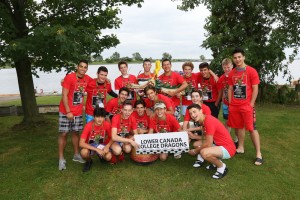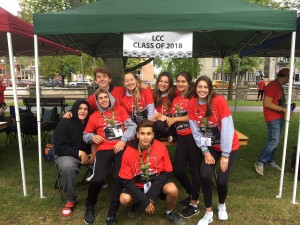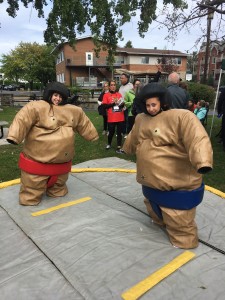 On Saturday, September 9, 19 friends and I attended the 12th Annual Fuller Landau Cedars CanSupport Dragon Boat race and festival. We had to wake up bright and early to be there for 8 am, but it was worth it. We got to paddle a boat together in a few races, and it was a lot of fun. We learned a lot, notably the mindset that paddling together is more important than paddling hard. This doesn’t only apply to paddling, but to life in general. At lunch, we witnessed an inspiring ceremony, which consisted of a few minutes of silence, and then all of the cancer patients or survivors who were in attendance threw flowers into the water. All in all, it was a wonderful event for a good cause and a lot of fun. – William Hamilton ’19
On Saturday, September 9, 19 friends and I attended the 12th Annual Fuller Landau Cedars CanSupport Dragon Boat race and festival. We had to wake up bright and early to be there for 8 am, but it was worth it. We got to paddle a boat together in a few races, and it was a lot of fun. We learned a lot, notably the mindset that paddling together is more important than paddling hard. This doesn’t only apply to paddling, but to life in general. At lunch, we witnessed an inspiring ceremony, which consisted of a few minutes of silence, and then all of the cancer patients or survivors who were in attendance threw flowers into the water. All in all, it was a wonderful event for a good cause and a lot of fun. – William Hamilton ’19
Tag Archives: cancer
You Don’t Have to Win the Race to Feel Like a Winner!
 On Saturday, September 9, my friends and I spent the morning at the 12th Annual Fuller Landau CanSupport des Cedres Dragon Boat Race. We got there bright and early to prepare for our first race at 8:45 am which was against three other boats, one being another group of grade 10 LCC students! Unfortunately, we came in last place and the other LCC team came in 3rd. We didn’t let that get us down and immediately started strategizing for our second race in which we came in 3rd place!
On Saturday, September 9, my friends and I spent the morning at the 12th Annual Fuller Landau CanSupport des Cedres Dragon Boat Race. We got there bright and early to prepare for our first race at 8:45 am which was against three other boats, one being another group of grade 10 LCC students! Unfortunately, we came in last place and the other LCC team came in 3rd. We didn’t let that get us down and immediately started strategizing for our second race in which we came in 3rd place!
Not coming in last was definitely one of the highlights of the morning. Another highlight was watching my friends sumo wrestle in fat suits in between races!
All in all, everyone had so much fun at the dragon boat race and was so happy that we got to participate in such a great event supporting an amazing cause. — Danielle Cutler ’18

Exporting Cancer?
 Hearing from your doctor that “you have cancer” is a shocking and scary experience. That happened to me in 1988 just as my wife and I learned that she was pregnant with our first child. For every cancer patient, the journey about how to grapple with the diagnosis means one’s life has been altered forever. It is daunting to wrestle with cancer, as it is the great plague of the 20th & now the 21st centuries.
Hearing from your doctor that “you have cancer” is a shocking and scary experience. That happened to me in 1988 just as my wife and I learned that she was pregnant with our first child. For every cancer patient, the journey about how to grapple with the diagnosis means one’s life has been altered forever. It is daunting to wrestle with cancer, as it is the great plague of the 20th & now the 21st centuries.
In my case, I was supported by a fantastic medical team and endured minimal intervention and no surgeries. However, it took a full five years before the doctors declared me “cured” and “cancer-free.” Along the way my family endured a great deal emotionally. Because of my illness, I was removed from regular life insurance roles and had to dole out 300% for less insurance coverage for my growing family – after initially being told it would be a 700% increase – a struggle I had to wage on top of adjusting to the ramifications of the serious diagnosis.
Four years earlier I had lost my father to cancer and then lost my mother as well, 12 years later in 1996. Both my parents died from a different form of cancer, but according to their wishes they each died at home and with the dignity. I assure you, the practical elements of delivering the dignity they deserved was very draining on our extended family. I came to know cancer much better than I wanted to, but as it is in many domains, life often does not offer us choices. So now on the doorstep of real spring, I see April as cancer month. For me, it is painted yellow because of the national Canadian Cancer Society Daffodil fundraising campaign, and creative expressions of surging hope that emanate from cancer survivors across Canada. They reflect the importance of our collective efforts to all come together to defeat cancer’s scourge.
In the past several years, we have actually done incredibly well on this front. The Canadian Cancer Society reminds us that the billions of dollars that have been raised in recent decades to fund research and develop new treatments have had a positive impact. Happily, with new drug therapies, most cancers are actually in decline in Canada and across North America – and for some cancers, in rather significant ways. Pamela Fralick, the CEO of the Canadian Cancer Society says we are at “an exciting threshold and there is great optimism for a future where we will no longer have to fear the word cancer.” But note that during the past century, cancer has been a disease, primarily of the wealthy.
In the spirit of our LCC Destiny Quebec (DQ) student leadership conference focused on globalization, allow me to assert that globalization is not just about trade and the proliferation of new digital technologies. It also includes health, and cancer is our primary export. Yes, on the international cancer front, things are changing. Now more than 60% of new cancer cases in the world are occurring in poor and middle-income countries. According to the World Health Organization (WHO), by 2025 the share of global deaths in these poor countries is projected to rise to three-quarters – 75%. The numbers are on the rise in poor countries because diagnosis and care tends to be weak. However, we are also exporting – globalizing our Western lifestyles. This includes more people smoking, overeating, and fewer getting enough exercise. There seems to be a direct correlation with cancers of the lung, bowel and breast. In 2012, 14.1 million new cancer cases were diagnosed and 8.2 million died from the disease, 11% more than in 2008. By 2025 the number of new cases is expected to reach 19.3 million, a notable 37% increase, and mostly in the world’s poorest nations.
So we surely have more to do to steadily defeat cancer in our society. But let’s be aware that we have indeed arrested the growth of many cancers with new medications and expensive treatments. Yet this won’t work in the developing world. The cancer problem there is only beginning to truly surge and shock, and will shortly become the developing world’s deadliest killer. What will we do to address this form of globalization, this deadly export? I know that many of our students will have an impact by committing to successful careers in the health care sector. If that’s too far down the road for some, we can all start by wearing a daffodil pin today to support research and anyone you know who is a survivor or living with cancer today. Then consider “what else can I do?” –Christopher Shannon, Headmaster
